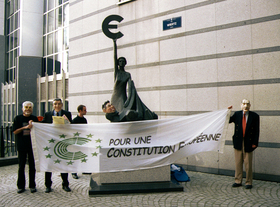

Constitution
A constitution is the basic rulebook for a state that
limits the powers of all authorities, including the legislators, and gives
citizens common fundamental rights.
The EU Court in Luxembourg has developed a system of EU law where EU rules and laws overrule and prevail over national laws and constitutions. The Court sees the EU legal system as a supra-national constitutional system. See the Court case "Les Verts" from 1986.
The proposal for the EU Constitution proposed a "constitutional Treaty" which would establish a "constitution for Europe" highlighting the primacy of EU rules and laws over national rules and laws - and also over national constitutions.
The word constitution was used 180 times in the proposed EU Constitution embodied in the Treaty Establishing a Constitution for Europe. The Lisbon Treaty has deleted the word “Constitution” everywhere in the text. Instead, it refers in Declaration No 17 to the existing case law of the EU Court having established the principle of the primacy of EU law.
There is also a statement from the Court referring to the EU treaties as 'the Constitutional Charter of a Community of Law, a new legal order for the sake of which the States have limited their sovereign rights” (Opinion 1/91).
The Melloni case from 2013 also gives the Charter for Fundamental Rights primacy over national constitutions.
Before, a country could only leave the EU by a unanimous decision of the Council or by breaching the rules. The Lisbon Treaty makes it possible to leave the EU within the two years that an agreement is negotiated. The member states can decide to leave the EU on their own after two years.
Links
The main stages in the institutional reform of the European Union http://europa.eu/institutional_reform/index_en.htm
See presentation on the EU Constitution in pdf format: http://www.euabc.com/upload/pdf/overhead_en.pdf
Also see EU Constitution.
http://europa.eu.int/futurum/index_en.htm